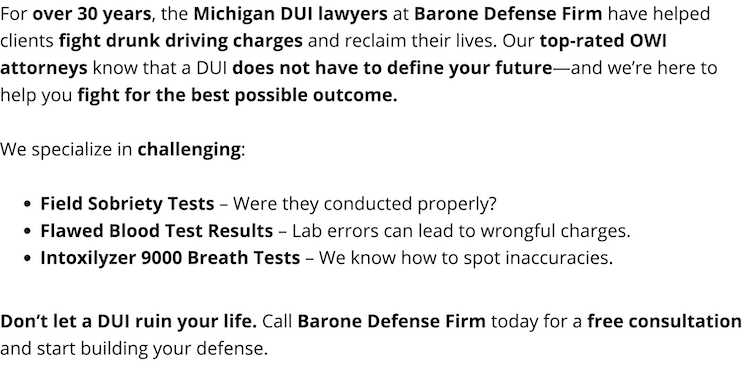Michigan DUI Appeals Attorney
Appeals After Trial and/or Conviction
Have you recently been convicted of driving under the influence (DUI) in Michigan? If you answered "yes," and you want the conviction removed from your record, you may want to file an appeal. While a Michigan DUI appeal is not a retrial, the law applied to your case, the manner in which the trial was conducted and the behavior and tactics of your trial lawyer and the prosecuting attorney will all be examined by a higher (appellate) court to ensure that your trial was fair. This is an appeal by right, meaning the court of appeals must hear your case.
If you plead guilty, then under some limited circumstances, you can appeal the fairness of the plea-taking process, or the lawfulness of your sentence. An appeal from a guilty plea is nearly always an appeal "by leave." This means the court of appeals must agree to, but is not required to, hearing your appeal. These kinds of appeals by leave are rarely allowed or granted.
Appeals before Trial or Conviction
There are also appeals that can happen before your case even goes to trial, and these are called "interlocutory" appeals. These kinds of appeals follow pretrial rulings of the trial judge that one of the parties believes is wrong or unfair. For example, if your trial judge says that the traffic stop was valid, but your lawyer thinks a proper application of law says otherwise, then this ruling can be appealed before the trial on your case happens.
Process of an Appeal
The way in which an appeal starts will depend on the kind of appeal you are pursuing. After a loss at trial you must usually ask the judge who originally presided over your case for a new trial. Please note that the judge approving this request is unlikely — it is just a step in the process.
Time is of the essence when requesting an appeal. You typically have a short time frame during which you can file a notice of appeal. In an appeal, the appellate court only looks at the record of the first DUI trial. This record consists of court transcripts, witness testimonies, and evidence. No new evidence is admitted during an appeal. Your attorney will submit a brief detailing why the conviction or sentencing was incorrect, and the state will then submit a brief arguing why the decision or sentencing should not be overturned.
Also, an appeal after a trial loss cannot be based on a factual discrepancy or disagreement. In a jury trial the jury is there to decide or resolve issues of fact, and what they have to say about the facts is final. However, if their decision was, or at least could have been, based on evidence that should not have been admitted by the trial judge, or if the trial judge misstated or provided the wrong instructions on the law, or if the prosecuting attorney committed misconduct, or if your lawyer was ineffective, then the court of appeals has the power to listen to and overturn your case and the jury's verdict of guilty.
How an Attorney can Help
The first thing your DUI appeals lawyer from the Barone Defense Firm will do is order the transcript from the trial court. Within the applicable time periods he will also file a claim or notice of appeal. After reviewing the transcript and spotting errors, your lawyer will submit a brief to the appeals court setting forth those errors and explaining why the law supports or even requires a reversal of the guilty plea. Eventually, the case will be set for oral argument, and your DUI appeals lawyer will appear and argue in favor of a reversal of the trial court.
Are you interested in appealing your DUI case? Contact the Barone DUI Defense Firm today for more information regarding Michigan DUI appeal.
 Barone Defense Firm Home
Barone Defense Firm Home
















